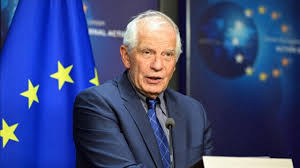The top foreign policy official for the European Union cautioned on Friday that if the region’s trade deficit with China is not reduced, public opinion in Europe may become more protectionist.
The EU’s top diplomat for foreign affairs, Josep Borrell, advocated for easier access for European businesses seeking to do business with or invest in China. He warned that European political leaders would come under pressure from constituents to cut ties with the second-largest economy in the world.
In a speech at Peking University, one of the top universities in China, Borrell stated, “And we don’t want to disengage and much less, much less, to decouple from China.”
In September, the EU’s trade imbalance with China exceeded $17 billion, raising the year’s total for the first nine months to $170 billion, according to Chinese trade data released on Friday.
The latest EU official to travel to China is Borrell, who later on Friday held meetings with Wang Yi, the foreign minister of China. The two countries are preparing for a leaders summit later this year. In addition to Economy and Trade Commissioner Valdis Dombrovskis, Energy Commissioner Kadri Simson is in Beijing this week.
In order to work together to address issues like climate change, global health, and the debt of developing countries, the EU and China must regain their mutual trust, according to Borrell.
We think there is a lot of scope and room for us to work together despite our significant differences, which shouldn’t be overlooked, he said.
With the EU and the US, two significant export destinations, China is attempting to ease tensions over trade and other matters. Following a string of trips by senior government figures, a U.S. Senate delegation traveled to China earlier this week as the two nations work to set up a meeting between Presidents Xi Jinping and Joe Biden in November.
Borrell called on China to increase humanitarian aid to Ukraine and suggested that in light of the war’s loss of historical and cultural heritage, China undertake a prominent cultural program.
He acknowledged China has political limitations and stated, “We are not asking China to adopt the same standpoint as the European Union.” However, we believe that China must make a significant effort to persuade the Ukrainian people that it is not supporting Russia in this conflict.
He added that, despite having relations with Taiwan, the EU does not recognize the island’s independence. The difficulties between Taiwan and China must be resolved via conversation, not pressure, he continued, adding that the EU opposes both.

















